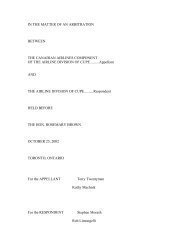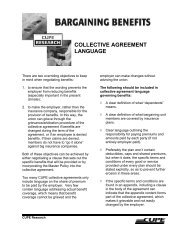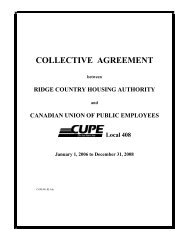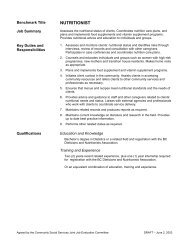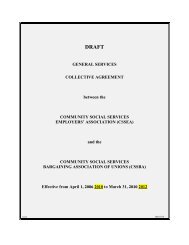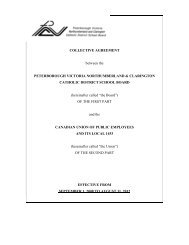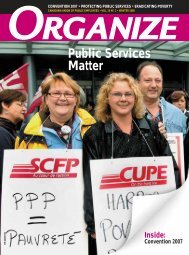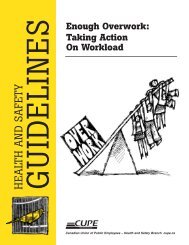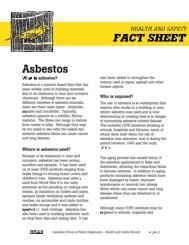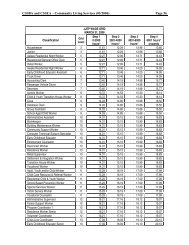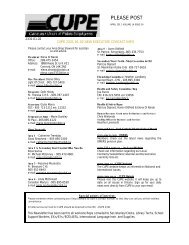Disability rights in the workplace - Canadian Union of Public ...
Disability rights in the workplace - Canadian Union of Public ...
Disability rights in the workplace - Canadian Union of Public ...
Create successful ePaper yourself
Turn your PDF publications into a flip-book with our unique Google optimized e-Paper software.
<strong>Disability</strong> <strong>rights</strong> <strong>in</strong> <strong>the</strong> <strong>workplace</strong><br />
Understand<strong>in</strong>g duty to accommodate
<strong>Disability</strong> <strong>rights</strong><br />
<strong>in</strong> <strong>the</strong> <strong>workplace</strong><br />
Understand<strong>in</strong>g duty to accommodate
Sisters and bro<strong>the</strong>rs,<br />
Advances <strong>in</strong> human <strong>rights</strong> have given unions new tools<br />
to fight for members. Employers, with <strong>the</strong> union<br />
play<strong>in</strong>g an active role, have an obligation to adapt<br />
work and <strong>workplace</strong>s to ensure that persons with<br />
disabilities have <strong>the</strong> right to employment without<br />
discrim<strong>in</strong>ation. A landmark court rul<strong>in</strong>g ensures<br />
accommodation <strong>of</strong> disabled employees, unless it<br />
would be impossible without impos<strong>in</strong>g undue hardship.<br />
This presents new opportunities for <strong>the</strong> union to<br />
advocate on behalf <strong>of</strong> our members with disabilities.<br />
There are also new opportunities for collective<br />
barga<strong>in</strong><strong>in</strong>g to ensure that our collective agreements<br />
<strong>in</strong>tegrate equality <strong>rights</strong>.<br />
Education will be important so that members know<br />
<strong>the</strong>ir <strong>rights</strong> and know <strong>the</strong> importance <strong>of</strong> our duty to<br />
accommodate.<br />
The area <strong>of</strong> human <strong>rights</strong> and discrim<strong>in</strong>ation on <strong>the</strong><br />
basis <strong>of</strong> disability will be a fast grow<strong>in</strong>g area <strong>of</strong><br />
arbitration. We can push for a creative expansion <strong>of</strong><br />
<strong>rights</strong> for our members and build more <strong>in</strong>clusive<br />
<strong>workplace</strong>s.
This guide is meant to be used by union advocates<br />
work<strong>in</strong>g with <strong>in</strong>jured workers, workers with a disability<br />
return<strong>in</strong>g to work after be<strong>in</strong>g on long-term disability<br />
or sick leave, and workers who have a disability<br />
whe<strong>the</strong>r or not <strong>the</strong>y have been <strong>of</strong>f <strong>the</strong> job.<br />
You will f<strong>in</strong>d an overview <strong>of</strong> disability and <strong>the</strong> duty to<br />
accommodate, a procedure to deal with <strong>the</strong> employer<br />
on <strong>the</strong> issues, and samples <strong>of</strong> exist<strong>in</strong>g collective<br />
agreement language. Resources for fur<strong>the</strong>r read<strong>in</strong>g<br />
and <strong>in</strong>formation are also provided.<br />
Through our collective efforts we can make big strides<br />
<strong>in</strong> secur<strong>in</strong>g <strong>the</strong> full <strong>rights</strong> <strong>of</strong> all our sisters and<br />
bro<strong>the</strong>rs, w<strong>in</strong>n<strong>in</strong>g respect and equality <strong>in</strong> our<br />
<strong>workplace</strong>s - and build<strong>in</strong>g an ever more diverse and<br />
welcom<strong>in</strong>g union.<br />
Judy Darcy<br />
National President<br />
Claude Généreux<br />
National Secretary-Treasurer
<strong>Disability</strong> <strong>rights</strong> <strong>in</strong> <strong>the</strong> <strong>workplace</strong><br />
Understand<strong>in</strong>g duty to accommodate<br />
<strong>Canadian</strong> <strong>Union</strong> <strong>of</strong> <strong>Public</strong> Employees<br />
cupe.ca<br />
Cover illustration, “Break<strong>in</strong>g Free”, by Natalie Wood.<br />
For fur<strong>the</strong>r <strong>in</strong>formation or to order copies <strong>of</strong> this guide, contact:<br />
Equality Branch<br />
<strong>Canadian</strong> <strong>Union</strong> <strong>of</strong> <strong>Public</strong> Employees<br />
21 Florence Street<br />
Ottawa, ON, K2P 0W6<br />
Phone (613) 237-1590<br />
Fax (613) 237-5508<br />
Email equality@cupe.ca<br />
© September 2002
Contents<br />
What is duty to accommodate . . . . . . . . . . . . . . . . . . . . . . . . . .1<br />
What is a disability . . . . . . . . . . . . . . . . . . . . . . . . . . . . . . . . . .3<br />
Duty to accommodate . . . . . . . . . . . . . . . . . . . . . . . . . . . . . . . .5<br />
Undue hardship . . . . . . . . . . . . . . . . . . . . . . . . . . . . . . . . . .7<br />
Supreme Court provides guidel<strong>in</strong>es . . . . . . . . . . . . . . . . . . .8<br />
What it means for employers . . . . . . . . . . . . . . . . . . . . . . . . . .10<br />
What it means for union members seek<strong>in</strong>g accommodation . . . .11<br />
What it means for CUPE local unions . . . . . . . . . . . . . . . . . . . . .12<br />
Advocacy . . . . . . . . . . . . . . . . . . . . . . . . . . . . . . . . . . . .12<br />
Education . . . . . . . . . . . . . . . . . . . . . . . . . . . . . . . . . . . .13<br />
Procedure . . . . . . . . . . . . . . . . . . . . . . . . . . . . . . . . . . . .14<br />
Grievances and human <strong>rights</strong> compla<strong>in</strong>ts . . . . . . . . . . . . . .17<br />
Collective barga<strong>in</strong><strong>in</strong>g . . . . . . . . . . . . . . . . . . . . . . . . . . . . .19<br />
No discrim<strong>in</strong>ation . . . . . . . . . . . . . . . . . . . . . . . . . . . .21<br />
Accommodation procedures . . . . . . . . . . . . . . . . . . . .22<br />
References and Resources . . . . . . . . . . . . . . . . . . . . . . . . . . . .25<br />
Appendix . . . . . . . . . . . . . . . . . . . . . . . . . . . . . . . . . . . . . . . . .27
What is duty to accommodate<br />
The duty to accommodate is an obligation upon<br />
employers, with <strong>the</strong> union play<strong>in</strong>g an active role, to<br />
adapt work and <strong>workplace</strong>s to allow persons with<br />
disabilities <strong>the</strong>ir right to employment without<br />
discrim<strong>in</strong>ation. It is a broad equality concept that<br />
applies to all grounds <strong>of</strong> discrim<strong>in</strong>ation that are<br />
covered under human <strong>rights</strong> legislation and <strong>the</strong><br />
equality <strong>rights</strong> provisions <strong>of</strong> <strong>the</strong> <strong>Canadian</strong> Charter <strong>of</strong><br />
Rights and Freedoms.<br />
This guide looks at accommodation only <strong>in</strong> <strong>the</strong><br />
context <strong>of</strong> disability. However, <strong>the</strong> pr<strong>in</strong>ciples also<br />
apply for a local union look<strong>in</strong>g for ways to<br />
accommodate members based on all <strong>the</strong> o<strong>the</strong>r<br />
grounds <strong>of</strong> discrim<strong>in</strong>ation.<br />
1
Persons with disabilities are one <strong>of</strong> <strong>the</strong> most excluded<br />
groups from <strong>the</strong> workforce. They are subject to long<br />
periods <strong>of</strong> unemployment and are three times more<br />
likely not to be <strong>in</strong> <strong>the</strong> labour force at all. Many have<br />
sporadic, precarious low-pay<strong>in</strong>g work. Their rate <strong>of</strong><br />
full-year employment is less than half <strong>of</strong> <strong>Canadian</strong>s<br />
without disabilities. One <strong>of</strong> <strong>the</strong> reasons persons with<br />
disabilities are excluded from work is that employers<br />
have not looked at ways <strong>of</strong> chang<strong>in</strong>g <strong>workplace</strong>s to<br />
accommodate <strong>the</strong>ir needs. <strong>Union</strong>s can help change<br />
this by work<strong>in</strong>g to ensure <strong>the</strong> employer is meet<strong>in</strong>g<br />
<strong>the</strong>ir obligations to accommodate workers with<br />
disabilities.<br />
2
What is a disability<br />
All human <strong>rights</strong> statutes prohibit discrim<strong>in</strong>ation on<br />
<strong>the</strong> grounds <strong>of</strong> disability or handicap. The <strong>Canadian</strong><br />
Charter <strong>of</strong> Rights and Freedoms prohibits<br />
discrim<strong>in</strong>ation on <strong>the</strong> grounds <strong>of</strong> disability under<br />
Section 15, <strong>the</strong> equality <strong>rights</strong> provisions.<br />
Discrim<strong>in</strong>ation on <strong>the</strong> grounds <strong>of</strong> disability is a<br />
concept that is expand<strong>in</strong>g as legal cases frame new<br />
practices and obligations. Generally, disability<br />
<strong>in</strong>cludes any physical disability or <strong>in</strong>firmity regardless<br />
<strong>of</strong> its cause, any <strong>in</strong>tellectual disability or impairment,<br />
or a learn<strong>in</strong>g disability. It also <strong>in</strong>cludes psychiatric<br />
and mental disabilities. Discrim<strong>in</strong>ation on <strong>the</strong> grounds<br />
<strong>of</strong> disability occurs when <strong>the</strong> disability impacts on <strong>the</strong><br />
employee's duties at work or <strong>the</strong> employer perceives it<br />
will impact on <strong>the</strong>ir duties at work.<br />
3
Over <strong>the</strong> years, human <strong>rights</strong> tribunals and labour<br />
arbitration boards have expanded <strong>the</strong> def<strong>in</strong>ition <strong>of</strong><br />
disability to <strong>in</strong>clude, for example: HIV/AIDS,<br />
depression, heart condition, alcoholism,<br />
hypertension, and chronic diseases such as diabetes,<br />
colour bl<strong>in</strong>dness and dyslexia.<br />
<strong>Disability</strong> can arise from a condition at birth, an<br />
illness, or an <strong>in</strong>jury. Human <strong>rights</strong> do not dist<strong>in</strong>guish<br />
<strong>the</strong> source. This means that workers with disabilities<br />
are owed <strong>the</strong> duty <strong>of</strong> accommodation whe<strong>the</strong>r or not<br />
<strong>the</strong>y have ever been absent from work or been on sick<br />
leave, long-term disability or workers' compensation.<br />
The disability can also be temporary, permanent, or<br />
recurr<strong>in</strong>g. The duty to accommodate rema<strong>in</strong>s <strong>the</strong><br />
same. The duty is owed all employees whe<strong>the</strong>r <strong>the</strong>y<br />
are new employees, casual, temporary or permanent.<br />
4
Duty to accommodate<br />
In 1999, <strong>the</strong> Supreme Court <strong>of</strong> Canada made a<br />
landmark rul<strong>in</strong>g that obliges an employer to justify<br />
any work requirement that appears discrim<strong>in</strong>atory.<br />
Their rul<strong>in</strong>g - <strong>in</strong> what is called <strong>the</strong> Meior<strong>in</strong> case - also<br />
set out a groundbreak<strong>in</strong>g test that establishes a new<br />
standard for human <strong>rights</strong> and arbitration purposes.<br />
To meet that test, an employer must justify any<br />
practise or work requirement that appears<br />
discrim<strong>in</strong>atory by demonstrat<strong>in</strong>g on balance:<br />
1. That <strong>the</strong> employer adopted <strong>the</strong> standard for<br />
a purpose rationally connected to <strong>the</strong><br />
performance <strong>of</strong> <strong>the</strong> job;<br />
2. That <strong>the</strong> employer adopted <strong>the</strong> particular<br />
standard <strong>in</strong> an honest and good faith belief<br />
that it was necessary to <strong>the</strong> fulfillment <strong>of</strong><br />
that legitimate work-related purpose; and<br />
3. That <strong>the</strong> standard is reasonably necessary to<br />
<strong>the</strong> accomplishment <strong>of</strong> that legitimate workrelated<br />
purpose. To show that <strong>the</strong> standard<br />
is reasonably necessary, it must be<br />
demonstrated that it is impossible to<br />
5
accommodate <strong>in</strong>dividual employees shar<strong>in</strong>g<br />
<strong>the</strong> characteristics <strong>of</strong> <strong>the</strong> claimant without<br />
impos<strong>in</strong>g undue hardship upon <strong>the</strong> employer.<br />
British Columbia (<strong>Public</strong> Service Employee<br />
Relations Commission) v. B.C.G.E.U. [1999]<br />
3 S.C.R. 3 (Meior<strong>in</strong>)<br />
This means that if <strong>the</strong> employer has a work<br />
requirement that is discrim<strong>in</strong>atory <strong>the</strong>y must show<br />
that <strong>the</strong> requirement is related to do<strong>in</strong>g <strong>the</strong> job and<br />
that it was established <strong>in</strong> good faith to accomplish<br />
<strong>the</strong> work <strong>of</strong> <strong>the</strong> employer, and f<strong>in</strong>ally, that <strong>the</strong><br />
requirement is necessary to <strong>the</strong> job. Part <strong>of</strong> <strong>the</strong><br />
prov<strong>in</strong>g 'necessary to <strong>the</strong> job' is to show that it would<br />
be impossible to accommodate <strong>the</strong> worker without<br />
undue hardship to <strong>the</strong> employer.<br />
Most discrim<strong>in</strong>atory work practices pass <strong>the</strong> first two<br />
parts <strong>of</strong> <strong>the</strong> test. It is <strong>the</strong> third part <strong>of</strong> <strong>the</strong> test<br />
deal<strong>in</strong>g with undue hardship where <strong>the</strong> test is most<br />
challeng<strong>in</strong>g and difficult to pass.<br />
6
Undue hardship<br />
The employer must prove undue hardship. It is a<br />
difficult standard to meet. Undue hardship for <strong>the</strong><br />
employer means primarily hardship due to<br />
impossibility, serious risk or excessive cost. Aside from<br />
impossibility, two major issues have been identified as<br />
key to <strong>the</strong> analysis <strong>of</strong> what is undue hardship:<br />
• If <strong>the</strong> f<strong>in</strong>ancial costs associated with <strong>the</strong><br />
accommodation would be prohibitive to <strong>the</strong><br />
po<strong>in</strong>t that it would alter <strong>the</strong> essential nature<br />
or substantially affect <strong>the</strong> viability <strong>of</strong> <strong>the</strong><br />
enterprise. However <strong>the</strong> employer's ability to<br />
raise funds from outside sources will be<br />
considered <strong>in</strong>clud<strong>in</strong>g apply<strong>in</strong>g for grants to<br />
obta<strong>in</strong> devices to assist a worker to<br />
accomplish <strong>the</strong> tasks <strong>of</strong> <strong>the</strong> job.<br />
• If health and safety considerations are not met;<br />
<strong>in</strong> particular where <strong>the</strong> degree <strong>of</strong> risk, which<br />
rema<strong>in</strong>s after accommodation has been made,<br />
is so significant that it outweighs <strong>the</strong> benefits <strong>of</strong><br />
<strong>the</strong> accommodation. <strong>Public</strong> safety and <strong>the</strong><br />
health and safety <strong>of</strong> co-workers are<br />
considerations <strong>in</strong> this regard. However, if <strong>the</strong><br />
only risk is to <strong>the</strong> person to be accommodated<br />
<strong>the</strong>n <strong>the</strong> standard is higher.<br />
7
Persons with disabilities <strong>of</strong>ten f<strong>in</strong>d that standards meant<br />
to protect <strong>the</strong> general workforce are barriers to <strong>the</strong>m ever<br />
participat<strong>in</strong>g <strong>in</strong> <strong>the</strong> labour force. They are will<strong>in</strong>g to<br />
assume a higher level <strong>of</strong> risk to <strong>the</strong>mselves so <strong>the</strong>y can<br />
have <strong>the</strong> opportunity <strong>of</strong> work<strong>in</strong>g. The worker with a<br />
disability is allowed <strong>the</strong> dignity <strong>of</strong> assum<strong>in</strong>g risk so long<br />
as it is completely voluntary and it is not excessive.<br />
The threshold <strong>of</strong> undue hardship will vary depend<strong>in</strong>g on<br />
<strong>the</strong> size <strong>of</strong> <strong>the</strong> employer's operation, but <strong>the</strong> burden<br />
must be considered substantial to meet <strong>the</strong> above test.<br />
Supreme Court provides guidel<strong>in</strong>es<br />
The Supreme Court <strong>of</strong> Canada rul<strong>in</strong>g <strong>in</strong> <strong>the</strong> 1999 Meior<strong>in</strong> case<br />
sets out questions to ask when review<strong>in</strong>g a <strong>workplace</strong><br />
practice to see if it was reasonably necessary:<br />
a. has <strong>the</strong> employer <strong>in</strong>vestigated alternative<br />
approaches that do not have a discrim<strong>in</strong>atory<br />
effect, such as <strong>in</strong>dividuals test<strong>in</strong>g aga<strong>in</strong>st a<br />
more <strong>in</strong>dividually sensitive standard<br />
b. if alternative standards were <strong>in</strong>vestigated and<br />
found to be capable <strong>of</strong> fulfill<strong>in</strong>g <strong>the</strong> employers'<br />
purpose, why were <strong>the</strong>y not implemented<br />
8
c. is it necessary to have all employees meet<br />
<strong>the</strong> s<strong>in</strong>gle standard for <strong>the</strong> employer to<br />
accomplish its legitimate purpose or could<br />
standards reflective <strong>of</strong> group or <strong>in</strong>dividual<br />
differences and capabilities be<br />
established<br />
d. is <strong>the</strong>re a way to do <strong>the</strong> job that is less<br />
discrim<strong>in</strong>atory while still accomplish<strong>in</strong>g <strong>the</strong><br />
employer's legitimate purpose<br />
e. is <strong>the</strong> standard properly designed to ensure<br />
that <strong>the</strong> desired qualifications are met<br />
without plac<strong>in</strong>g an undue burden on those<br />
to whom <strong>the</strong> standard applies<br />
f. have o<strong>the</strong>r parties who are obliged to assist<br />
<strong>the</strong> search for possible accommodation<br />
fulfilled <strong>the</strong>ir roles"<br />
British Columbia (<strong>Public</strong> Service Employee<br />
Relations Commission) v. B.C.G.E.U. [1999] 3.<br />
S.C.R. 3 (Meior<strong>in</strong>)<br />
9
What it means for employers<br />
S<strong>in</strong>ce <strong>the</strong> rul<strong>in</strong>g, <strong>the</strong> employer has an obligation to<br />
develop <strong>workplace</strong> practices and standards that<br />
accommodate all employees and build equality <strong>in</strong> <strong>the</strong>ir<br />
<strong>workplace</strong>. This means that <strong>the</strong> employer must also<br />
make sure that discrim<strong>in</strong>atory rules and practices are<br />
elim<strong>in</strong>ated. This is a forward-look<strong>in</strong>g requirement.<br />
Now <strong>the</strong> employer must th<strong>in</strong>k about equality even if<br />
<strong>the</strong>re isn't a specific request before <strong>the</strong>m.<br />
The new test means that employers have a greater<br />
obligation to accommodate <strong>in</strong>dividual employee requests<br />
for accommodation. They must be more creative about<br />
how an <strong>in</strong>dividual with a disability can be accommodated.<br />
The employer must work with <strong>the</strong> employee and <strong>the</strong><br />
union to seek accommodation and respect <strong>the</strong><br />
collective agreement.<br />
The employer must ma<strong>in</strong>ta<strong>in</strong> confidentiality and<br />
request only <strong>in</strong>formation that is required to make <strong>the</strong><br />
accommodation.<br />
The employer should make sure education on<br />
disability and <strong>the</strong> duty to accommodate is provided<br />
to all employees.<br />
10
What it means for<br />
union members seek<strong>in</strong>g<br />
accommodation<br />
The union member should <strong>in</strong>form <strong>the</strong>ir employer <strong>of</strong> <strong>the</strong>ir<br />
need for accommodation and cooperate <strong>in</strong> provid<strong>in</strong>g<br />
<strong>the</strong> necessary <strong>in</strong>formation. Sometimes <strong>the</strong> member is<br />
unable to <strong>in</strong>form <strong>the</strong> employer because <strong>of</strong> <strong>the</strong> nature <strong>of</strong><br />
<strong>the</strong> disability. For example, workers with psychiatric or<br />
<strong>in</strong>tellectual disabilities may be unable to identify or<br />
express <strong>the</strong>ir needs for accommodation.<br />
The employee must provide sufficient <strong>in</strong>formation to <strong>the</strong><br />
employer concern<strong>in</strong>g restrictions or limitations <strong>in</strong>clud<strong>in</strong>g<br />
necessary <strong>in</strong>formation from health pr<strong>of</strong>essionals. The<br />
employee doesn't have to reveal <strong>the</strong> actual diagnosis so<br />
long as sufficient <strong>in</strong>formation about restrictions and<br />
accommodation needs is provided. Prejudices can be<br />
triggered about <strong>the</strong> extent <strong>of</strong> work limitations based on<br />
differ<strong>in</strong>g understand<strong>in</strong>gs <strong>of</strong> <strong>the</strong> implications <strong>of</strong> a<br />
diagnosis. Sometimes though <strong>the</strong> diagnosis is known by<br />
virtue <strong>of</strong> <strong>the</strong> accommodation needs.<br />
The member has a responsibility to work with <strong>the</strong> union<br />
and <strong>the</strong> employer to discuss reasonable solutions and<br />
participate <strong>in</strong> <strong>the</strong> accommodation process.<br />
11
What it means for<br />
CUPE local unions<br />
Advocacy<br />
The local union has a key role to play <strong>in</strong> end<strong>in</strong>g<br />
<strong>workplace</strong> discrim<strong>in</strong>ation and assum<strong>in</strong>g responsibility<br />
<strong>in</strong> achiev<strong>in</strong>g accommodation. Past court decisions<br />
have put responsibility on <strong>the</strong> union to participate<br />
with <strong>the</strong> employer <strong>in</strong> accommodat<strong>in</strong>g <strong>the</strong> worker<br />
protected under human <strong>rights</strong> legislation. The union<br />
can't negotiate out <strong>of</strong> its obligations under human<br />
<strong>rights</strong> legislation. The union can be liable if it stands<br />
<strong>in</strong> <strong>the</strong> way <strong>of</strong> an accommodation proposal. (Central<br />
Okanagan School District No. 23 v. Renaud [1992]<br />
2 S.C.R. 970)<br />
A 2002 Ontario Human Rights Board <strong>of</strong> Inquiry held a<br />
union responsible for not participat<strong>in</strong>g <strong>in</strong> an<br />
accommodation for a member by refus<strong>in</strong>g to transfer<br />
seniority from one barga<strong>in</strong><strong>in</strong>g unit to ano<strong>the</strong>r. The<br />
union was f<strong>in</strong>ed $22,000.<br />
While <strong>the</strong> union has a role to play <strong>in</strong> accommodation,<br />
it is still <strong>the</strong> employer that has <strong>the</strong> <strong>in</strong>formation and<br />
power to f<strong>in</strong>d <strong>the</strong> solutions. With <strong>the</strong> developments <strong>in</strong><br />
12
equality <strong>rights</strong>, <strong>the</strong>re are new tools to challenge<br />
employers to f<strong>in</strong>d solutions. <strong>Union</strong>s have a greater<br />
role <strong>in</strong> <strong>the</strong> <strong>workplace</strong> on equality issues.<br />
We can use developments <strong>in</strong> equality law to push<br />
employers to review and design <strong>workplace</strong>s that are<br />
barrier free and accessible for all.<br />
The local union must advocate for <strong>the</strong> <strong>in</strong>dividual<br />
member seek<strong>in</strong>g accommodation and follow-up to<br />
make sure <strong>the</strong> solution is really work<strong>in</strong>g. Often<br />
accommodations must be cont<strong>in</strong>ually reviewed to<br />
make sure all <strong>the</strong> necessary adjustments are made.<br />
All members have <strong>the</strong> right to accommodation<br />
whe<strong>the</strong>r <strong>the</strong>y are new workers, temporary or<br />
permanent, part-time or full-time.<br />
Once an accommodation is made, <strong>the</strong> member has<br />
<strong>the</strong> same right as everyone else to apply for new<br />
positions. If <strong>the</strong>y qualify and have <strong>the</strong> seniority, <strong>the</strong>n<br />
<strong>the</strong>re is an obligation to <strong>in</strong>vestigate whe<strong>the</strong>r <strong>the</strong> new<br />
position can be accommodated.<br />
Education<br />
The local union can make sure that all union members<br />
participate <strong>in</strong> education on equality issues and <strong>the</strong><br />
13
duty to accommodate. Members need to know <strong>the</strong>ir<br />
<strong>rights</strong> so <strong>the</strong>y can come forward when <strong>the</strong>y have<br />
accommodation issues. Members work<strong>in</strong>g with o<strong>the</strong>r<br />
members that are be<strong>in</strong>g accommodated need to<br />
understand that accommodation is a right so <strong>the</strong> worker<br />
receiv<strong>in</strong>g accommodation feels welcome <strong>in</strong> <strong>the</strong><br />
<strong>workplace</strong>.<br />
Accommodation is a union issue and every member can<br />
play a positive role to make sure we are mak<strong>in</strong>g our<br />
<strong>workplace</strong>s <strong>in</strong>clusive.<br />
Procedure<br />
We can be creative <strong>in</strong> seek<strong>in</strong>g accommodation. There are<br />
opportunities to seek new bundl<strong>in</strong>g <strong>of</strong> tasks and creat<strong>in</strong>g<br />
new jobs as part <strong>of</strong> <strong>the</strong> accommodation toolbox.<br />
Bundl<strong>in</strong>g tasks means look<strong>in</strong>g at a number <strong>of</strong> jobs and <strong>the</strong><br />
tasks <strong>in</strong>volved to rearrange <strong>the</strong> tasks <strong>in</strong> order to create a<br />
job that can accommodate a worker with a disability. For<br />
example, a clerical worker has a disability that prevents<br />
bend<strong>in</strong>g over and fil<strong>in</strong>g. It may be possible to review all<br />
clerical jobs <strong>in</strong> order to provide accommodation. If <strong>the</strong>re<br />
are a number <strong>of</strong> clerical jobs that require fil<strong>in</strong>g as one<br />
part <strong>of</strong> <strong>the</strong> job, it may be possible to rearrange <strong>the</strong> tasks<br />
so that one <strong>of</strong> <strong>the</strong> jobs doesn't require fil<strong>in</strong>g.<br />
14
Many unions are advocat<strong>in</strong>g creative solutions for<br />
accommodation. Accommodation is employer-wide.<br />
It is not restricted to <strong>the</strong> member's worksite.<br />
Employers with larger <strong>workplace</strong>s will have more<br />
resources and opportunities to accommodate without<br />
undue hardship. However <strong>the</strong>re are solutions to be<br />
found even <strong>in</strong> a small <strong>workplace</strong>.<br />
Accommodation must not become 'managed care'<br />
where <strong>the</strong> focus is on chang<strong>in</strong>g and 'cur<strong>in</strong>g' <strong>the</strong><br />
worker with<strong>in</strong> pre-established timeframes to get<br />
<strong>the</strong>m 'fit' to return to work. True accommodation<br />
focuses on chang<strong>in</strong>g <strong>the</strong> <strong>workplace</strong> for <strong>the</strong> worker<br />
based on <strong>the</strong>ir needs. Activists can use <strong>the</strong> duty to<br />
accommodate to press for ergonomic changes to <strong>the</strong><br />
<strong>workplace</strong>.<br />
Accommodation legal cases have exam<strong>in</strong>ed as <strong>the</strong> first<br />
step <strong>the</strong> ability to accommodate <strong>the</strong> worker <strong>in</strong> <strong>the</strong>ir<br />
exist<strong>in</strong>g job. The very last step would be to see whe<strong>the</strong>r<br />
disturb<strong>in</strong>g some <strong>of</strong> <strong>the</strong> <strong>rights</strong> conta<strong>in</strong>ed <strong>in</strong> <strong>the</strong><br />
collective agreement could accommodate <strong>the</strong> worker.<br />
The follow<strong>in</strong>g procedure is based upon <strong>the</strong> approach<br />
arbitrators have taken to accommodation that has<br />
been adopted by many unions:<br />
15
1<br />
2<br />
3<br />
4<br />
5<br />
Accommodate <strong>the</strong> exist<strong>in</strong>g job through work<br />
reorganization and methods, provid<strong>in</strong>g assistive<br />
devices, chang<strong>in</strong>g <strong>the</strong> work equipment or work<br />
area, and/or provid<strong>in</strong>g additional assistance<br />
and/or tra<strong>in</strong><strong>in</strong>g.<br />
Locate an alternate job with<strong>in</strong> <strong>the</strong> member's<br />
classification that can be accommodated or<br />
requires no accommodation or bundle tasks with<strong>in</strong><br />
<strong>the</strong> exist<strong>in</strong>g classification.<br />
Locate a job with<strong>in</strong> <strong>the</strong> barga<strong>in</strong><strong>in</strong>g unit that can<br />
be accommodated or bundle tasks. Some local<br />
unions have also barga<strong>in</strong>ed new jobs as part <strong>of</strong> an<br />
accommodation program. It is important that<br />
<strong>the</strong>se jobs be mean<strong>in</strong>gful and not token jobs.<br />
Seek positions with <strong>the</strong> employer outside <strong>the</strong><br />
barga<strong>in</strong><strong>in</strong>g unit.<br />
Alterations to <strong>rights</strong> set out <strong>in</strong> <strong>the</strong> collective<br />
agreement <strong>in</strong>clud<strong>in</strong>g seniority are considered only<br />
after all o<strong>the</strong>r options have been exhausted. The<br />
duty to accommodate does not mean displac<strong>in</strong>g<br />
an exist<strong>in</strong>g employee to accommodate ano<strong>the</strong>r.<br />
The union and <strong>the</strong> employer must agree to any<br />
changes that would affect seniority.<br />
16
Grievances and<br />
human <strong>rights</strong> compla<strong>in</strong>ts<br />
New equality law provides <strong>the</strong> opportunity to review<br />
policies and standards with a view to improv<strong>in</strong>g <strong>the</strong>m.<br />
The local union must consider all options when mak<strong>in</strong>g<br />
<strong>the</strong> decision whe<strong>the</strong>r to submit a grievance, a human<br />
<strong>rights</strong> compla<strong>in</strong>t, or both. It depends on <strong>the</strong><br />
collective agreement language as well as <strong>the</strong> public<br />
policy implications <strong>of</strong> <strong>the</strong> case. Arbitration can <strong>of</strong>ten<br />
be a speedier road to a resolution than a human <strong>rights</strong><br />
tribunal. However, sometimes when <strong>the</strong>re is a case<br />
that could break new ground, a human <strong>rights</strong> case<br />
may be advised. Check with CUPE staff for advice.<br />
Accord<strong>in</strong>g to <strong>the</strong> Meior<strong>in</strong> decision <strong>the</strong> duty to<br />
accommodate is forward look<strong>in</strong>g and doesn't depend<br />
on an actual request from an <strong>in</strong>dividual. This means<br />
union locals can also make policy grievances to<br />
challenge <strong>workplace</strong> practices that have a<br />
discrim<strong>in</strong>atory effect on workers with disabilities.<br />
17
We can seek a wider range <strong>of</strong> remedies such as<br />
strik<strong>in</strong>g down <strong>workplace</strong> rules, standards or policies<br />
or seek<strong>in</strong>g damages. Arbitrators are becom<strong>in</strong>g more<br />
creative with remedies. Arbitration awards have had<br />
resolutions such as:<br />
• Elim<strong>in</strong>at<strong>in</strong>g a particular work shift that was<br />
found to be discrim<strong>in</strong>atory because it required<br />
constant heavy lift<strong>in</strong>g with no opportunity for<br />
a rotation <strong>of</strong> duties and discrim<strong>in</strong>ated on <strong>the</strong><br />
basis <strong>of</strong> physical disability.<br />
• Requir<strong>in</strong>g <strong>the</strong> employer to search for duties to<br />
accommodate a casual worker on a call-<strong>in</strong> list<br />
who was <strong>in</strong>jured <strong>of</strong>f <strong>the</strong> job and <strong>in</strong>dicated he was<br />
available for light duties.<br />
• Requir<strong>in</strong>g <strong>the</strong> employer to redesign some jobs<br />
through re-bundl<strong>in</strong>g tasks and provid<strong>in</strong>g tools<br />
to ease <strong>the</strong> heavy lift<strong>in</strong>g demands for workers<br />
with physical disabilities.<br />
We must make sure that we provide enough evidence<br />
at arbitration to make <strong>the</strong> claim for discrim<strong>in</strong>ation to<br />
counter <strong>the</strong> employer's defence as well as<br />
establish<strong>in</strong>g <strong>the</strong> employer's failure to accommodate.<br />
18
Collective barga<strong>in</strong><strong>in</strong>g<br />
Us<strong>in</strong>g <strong>the</strong> opportunity and <strong>the</strong> tools provided by <strong>the</strong><br />
advances <strong>in</strong> equality <strong>rights</strong> law, we can review our<br />
collective agreements with a view to propos<strong>in</strong>g<br />
contract language that ensures equality for members<br />
with disabilities:<br />
• comprehensive anti-discrim<strong>in</strong>ation clauses;<br />
• jo<strong>in</strong>t processes, committees, and procedure to<br />
accommodate all members' requests for<br />
accommodation based on disability regardless<br />
<strong>of</strong> source;<br />
• tra<strong>in</strong><strong>in</strong>g opportunities;<br />
• education on human <strong>rights</strong> issues <strong>in</strong> <strong>the</strong><br />
<strong>workplace</strong>;<br />
• seniority accumulation protection for<br />
members <strong>of</strong>f on sick leave and long-term<br />
disability;<br />
19
• provisions for extended health benefits (drugs,<br />
medical aids, vision-care, dental care,<br />
hospital coverage, o<strong>the</strong>r health services such<br />
as massage, and nurs<strong>in</strong>g home care), leave<br />
provisions, and o<strong>the</strong>r provisions that help<br />
members with disabilities stay at <strong>the</strong><br />
<strong>workplace</strong>;<br />
• good sick leave and long-term disability<br />
provisions;<br />
• right to participate <strong>in</strong> a review <strong>of</strong> <strong>workplace</strong> to<br />
audit practices that impact members with<br />
disabilities.<br />
20
No discrim<strong>in</strong>ation<br />
The obligation under <strong>the</strong> collective agreement for <strong>the</strong><br />
employer's duty to accommodate is conta<strong>in</strong>ed <strong>in</strong> <strong>the</strong><br />
'no discrim<strong>in</strong>ation' clauses. Includ<strong>in</strong>g no<br />
discrim<strong>in</strong>ation provisions will give <strong>the</strong> local union <strong>the</strong><br />
right to seek remedies for discrim<strong>in</strong>ation through<br />
arbitration.<br />
CUPE locals have negotiated no discrim<strong>in</strong>ation<br />
clauses that <strong>in</strong>corporate <strong>the</strong> listed grounds <strong>in</strong> human<br />
<strong>rights</strong> legislation. O<strong>the</strong>r CUPE agreements list <strong>the</strong><br />
grounds specifically without reference to human<br />
<strong>rights</strong> legislation. This can provide for <strong>the</strong> expansion<br />
<strong>of</strong> grounds <strong>of</strong> discrim<strong>in</strong>ation to those not yet<br />
protected under every prov<strong>in</strong>ce's human <strong>rights</strong><br />
legislation such as crim<strong>in</strong>al record unrelated to <strong>the</strong><br />
job (or for which a pardon has been granted) and<br />
discrim<strong>in</strong>ation on <strong>the</strong> grounds <strong>of</strong> transsexual<br />
transition or gender identity status.<br />
Because developments <strong>in</strong> human <strong>rights</strong> legislation<br />
and <strong>in</strong>terpretation are rapidly chang<strong>in</strong>g, contract<br />
language could become out-<strong>of</strong>-date if compliance<br />
with human <strong>rights</strong> legislation is not specifically<br />
required. For that reason, contract language should<br />
be checked regularly with <strong>the</strong> legislation. Includ<strong>in</strong>g<br />
21
oth not-yet-listed protections and requir<strong>in</strong>g<br />
compliance with human <strong>rights</strong> legislation provides<br />
<strong>the</strong> maximum coverage.<br />
See <strong>the</strong> Appendix for examples <strong>of</strong> no discrim<strong>in</strong>ation<br />
clauses.<br />
Accommodation procedures<br />
Some CUPE collective agreements provide for jo<strong>in</strong>t<br />
accommodation committees and processes for<br />
employees who have been <strong>in</strong> receipt <strong>of</strong> workers'<br />
compensation benefits. Some agreements provide<br />
for workers return<strong>in</strong>g from long-term disability.<br />
These provisions can be changed to provide a jo<strong>in</strong>t<br />
procedure for all employees who may require<br />
accommodation for a disability whe<strong>the</strong>r or not <strong>the</strong>y<br />
have ever been <strong>of</strong>f work or on sick leave, long-term<br />
disability or <strong>in</strong> receipt <strong>of</strong> workers' compensation<br />
benefits.<br />
We must try to negotiate provisions to ensure<br />
members with disabilities get <strong>the</strong> accommodation<br />
<strong>the</strong>y need whe<strong>the</strong>r <strong>the</strong> disability is permanent or<br />
temporary and without regard to <strong>the</strong> source <strong>of</strong> <strong>the</strong><br />
disability.<br />
22
The procedure should be <strong>in</strong>corporated <strong>in</strong>to <strong>the</strong><br />
collective agreement so that <strong>the</strong> employer's<br />
obligation to modify <strong>the</strong> <strong>workplace</strong>, adapt<br />
equipment, obta<strong>in</strong> equipment, and restructure jobs is<br />
established clearly. The obligation to consult with<br />
and work with <strong>the</strong> union must also be established <strong>in</strong><br />
<strong>the</strong> collective agreement.<br />
There should be a dispute resolution mechanism <strong>in</strong><br />
<strong>the</strong> collective agreement that is tailored to<br />
accommodation for members with a disability. An<br />
expedited arbitration or decision-mak<strong>in</strong>g process<br />
with someone who is knowledgeable <strong>in</strong> <strong>the</strong> area <strong>of</strong><br />
accommodation can help pave a smooth path for a<br />
member seek<strong>in</strong>g accommodation.<br />
A jo<strong>in</strong>t process to accommodate members with<br />
disabilities is important because <strong>the</strong> union also has<br />
responsibilities for <strong>the</strong> accommodation. The union is<br />
best placed to advocate for <strong>the</strong> member if it is<br />
engaged from <strong>the</strong> beg<strong>in</strong>n<strong>in</strong>g <strong>in</strong> a jo<strong>in</strong>t process with<br />
<strong>the</strong> employer. It is more difficult to advocate when<br />
<strong>the</strong> union is try<strong>in</strong>g to correct or amend an <strong>in</strong>adequate<br />
plan to accommodate a member. If <strong>the</strong> local has <strong>the</strong><br />
resources, a jo<strong>in</strong>t committee can be helpful as this<br />
helps build expertise <strong>in</strong>side <strong>the</strong> local. If a formal<br />
23
committee isn't possible it is still important to<br />
establish a jo<strong>in</strong>t process through <strong>the</strong> collective<br />
agreement.<br />
The Appendix conta<strong>in</strong>s some samples <strong>of</strong> exist<strong>in</strong>g<br />
collective agreement provisions <strong>in</strong> CUPE agreements.<br />
24
References and Resources<br />
A Place For All: A Guide To Creat<strong>in</strong>g an Inclusive<br />
Workplace, <strong>Canadian</strong> Human Rights<br />
Commission, 2001<br />
<strong>Canadian</strong> Council on Rehabilitation and Work,<br />
www.ccrw.ca<br />
<strong>Canadian</strong> Work<strong>in</strong>g Group on HIV Rehabilitation<br />
(CWGHR), www.hivandrehab.ca<br />
Contract Clauses, 3rd edition, Sack and Poskanzer<br />
CUPE kit on workload, Balanc<strong>in</strong>g work and family life,<br />
2001<br />
CUPE kits and materials on barga<strong>in</strong><strong>in</strong>g<br />
Duty To Accommodate: A PSAC Guide for Local<br />
Representatives, 2000<br />
25
Force For Change: Labour Force Participation for People<br />
Liv<strong>in</strong>g with HIV/AIDS, <strong>Canadian</strong> AIDS Society, 1998<br />
Overview <strong>of</strong> <strong>the</strong> Meior<strong>in</strong> Supreme Court Decision and Its<br />
Impact on <strong>Disability</strong> Rights, CLC, prepared by Kate<br />
A. Hughes, Cavalluzo Hayes Shilton McIntyre &<br />
Cornish, 2000<br />
Policy and Guidel<strong>in</strong>es on <strong>Disability</strong> and <strong>the</strong> Duty to<br />
Accommodate, Ontario Human Rights<br />
Commission, 2000<br />
The Duty to Accommodate <strong>in</strong> <strong>the</strong> <strong>Canadian</strong> Workplace,<br />
Michael Lynk, 2001,<br />
www.work<strong>in</strong>k.com/work<strong>in</strong>k/national/Lynk/lynk.htm<br />
26
Appendix<br />
NO DISCRIMINATION<br />
York University and CUPE 3903<br />
ARTICLE 4 - DISCRIMINATION AND HARASSMENT<br />
4.01 The Employer and <strong>the</strong> <strong>Union</strong> agree that <strong>the</strong>re<br />
shall be no discrim<strong>in</strong>ation, <strong>in</strong>terference,<br />
restriction, harassment or coercion, <strong>in</strong>clud<strong>in</strong>g<br />
no mandatory blood or ur<strong>in</strong>e tests, <strong>in</strong>clud<strong>in</strong>g<br />
but not limited to as <strong>the</strong>se relate to Acquired<br />
Immune Deficiency Syndrome (AIDS), AIDSrelated<br />
illness, AIDS-Related-Complex, or<br />
positive immune deficiency test, and <strong>in</strong>clud<strong>in</strong>g<br />
no genetic screen<strong>in</strong>g for specific medical<br />
disabilities or pregnancy, exercised or<br />
practised with respect to any member <strong>of</strong> <strong>the</strong><br />
barga<strong>in</strong><strong>in</strong>g unit <strong>in</strong> any matter concern<strong>in</strong>g <strong>the</strong><br />
application <strong>of</strong> <strong>the</strong> provisions <strong>of</strong> this Agreement<br />
by reason <strong>of</strong> race, creed, colour, age, sex,<br />
marital status, parental status, number <strong>of</strong><br />
dependents, nationality, ancestry, place <strong>of</strong><br />
orig<strong>in</strong>, native language (subject to Article<br />
12.02.1), disability or disabilities (subject to<br />
Article 12.02.1), Acquired Immune Deficiency<br />
27
Syndrome (AIDS), or AIDS-related illness, or<br />
AIDS-Related-Complex, or positive immune<br />
deficiency test (virus HIV) (subject to Article<br />
12.02.1), political or religious affiliations or<br />
orientations, academic affiliations or<br />
orientations (subject to <strong>the</strong> exercise <strong>of</strong><br />
academic freedom as set out <strong>in</strong> Article 14.01),<br />
record <strong>of</strong> <strong>of</strong>fences (except where such a record<br />
is a reasonable and bona fide ground for<br />
discrim<strong>in</strong>ation because <strong>of</strong> <strong>the</strong> nature <strong>of</strong> <strong>the</strong><br />
employment), sexual orientation, transsexual<br />
transition status, gender expression, and<br />
gender identity, nor by reason <strong>of</strong> her<br />
membership or non-membership or lawful<br />
activity or lack <strong>of</strong> activity <strong>in</strong> <strong>the</strong> <strong>Union</strong>, or <strong>the</strong><br />
exercise <strong>of</strong> any <strong>of</strong> <strong>the</strong> <strong>rights</strong> under this<br />
Agreement. The Employer undertakes that no<br />
York University student who is or has been<br />
employed <strong>in</strong> Unit 2 shall be penalized <strong>in</strong> her<br />
student status for <strong>the</strong> exercise <strong>of</strong> any <strong>of</strong> her<br />
<strong>rights</strong> under this Collective Agreement or by<br />
reason <strong>of</strong> her membership or non-membership<br />
or lawful activity or lack <strong>of</strong> activity <strong>in</strong> <strong>the</strong><br />
<strong>Union</strong>.<br />
28
Compensation Employees' <strong>Union</strong> and BC Workers'<br />
Compensation Board<br />
The Parties hereto subscribe to <strong>the</strong> pr<strong>in</strong>ciples<br />
<strong>of</strong> <strong>the</strong> Human Rights Act, SBC 1984, c.22. As<br />
stipulated <strong>in</strong> <strong>the</strong> Act, <strong>the</strong> Parties will not<br />
discrim<strong>in</strong>ate aga<strong>in</strong>st a person with respect to<br />
employment or any term or condition <strong>of</strong><br />
employment because <strong>of</strong> <strong>the</strong> race, colour,<br />
ancestry, place <strong>of</strong> orig<strong>in</strong>, political belief,<br />
religion, marital status, family status,<br />
physical or mental disability, sex, sexual<br />
orientation or age <strong>of</strong> that person or because<br />
that person has been convicted <strong>of</strong> a crim<strong>in</strong>al<br />
or summary conviction <strong>of</strong>fense that is<br />
unrelated to <strong>the</strong> employment or to <strong>the</strong><br />
<strong>in</strong>tended employment <strong>of</strong> that person.<br />
CUPE 4150 and <strong>the</strong> Nova Scotia Health Organizations<br />
4.01 The Employer and <strong>the</strong> <strong>Union</strong> agree that all<br />
Employees will be protected aga<strong>in</strong>st<br />
discrim<strong>in</strong>ation respect<strong>in</strong>g <strong>the</strong>ir human <strong>rights</strong><br />
and employment <strong>in</strong> all matters <strong>in</strong>clud<strong>in</strong>g age,<br />
race, colour, religion, creed, sex, sexual<br />
orientation, pregnancy, physical disability,<br />
mental disability, illness or disease, ethnic,<br />
29
national or aborig<strong>in</strong>al orig<strong>in</strong>, family status,<br />
marital status, source <strong>of</strong> <strong>in</strong>come, political<br />
belief, affiliation or activity, membership <strong>in</strong> a<br />
pr<strong>of</strong>essional association, bus<strong>in</strong>ess or trade<br />
association, employers' organization or<br />
Employees' organization, physical appearance,<br />
residence, or <strong>the</strong> association with o<strong>the</strong>rs<br />
similarly protected, or any o<strong>the</strong>r prohibition <strong>of</strong><br />
<strong>the</strong> Human Rights Act <strong>of</strong> Nova Scotia.<br />
ACCOMMODATION<br />
CUPE 1975 and <strong>the</strong> University <strong>of</strong> Reg<strong>in</strong>a and <strong>the</strong><br />
University <strong>of</strong> Saskatchewan<br />
19.15 Jo<strong>in</strong>t <strong>Union</strong>-Management Rehabilitation<br />
Committee<br />
There shall be a Jo<strong>in</strong>t <strong>Union</strong>-Management<br />
Committee consist<strong>in</strong>g <strong>of</strong> two management<br />
representatives, two <strong>Union</strong> representatives<br />
and a Chair to be appo<strong>in</strong>ted by mutual<br />
agreement between <strong>the</strong> University and <strong>the</strong><br />
<strong>Union</strong>.<br />
30
19.15.1 Committee Mandate<br />
The parties endorse <strong>the</strong> pr<strong>in</strong>ciples and<br />
importance <strong>of</strong> early <strong>in</strong>tervention and early<br />
return to work. The Committee will work <strong>in</strong> a<br />
consultative manner towards processes and<br />
procedures, which support <strong>the</strong>se pr<strong>in</strong>ciples.<br />
All actions <strong>of</strong> <strong>the</strong> Committee shall be with<strong>in</strong><br />
<strong>the</strong> terms <strong>of</strong> <strong>the</strong> Collective Agreement and<br />
current University policy. Changes or revisions<br />
to any policy related to <strong>the</strong> jurisdiction <strong>of</strong> this<br />
Committee shall be a matter <strong>of</strong> mutual<br />
agreement between <strong>the</strong> University and <strong>the</strong><br />
<strong>Union</strong>.<br />
19.15.2 Referral to Committee<br />
Cases may be referred to <strong>the</strong> Committee where<br />
an employee has not experienced significant<br />
time loss from work but where <strong>the</strong> Committee<br />
deems <strong>the</strong> probability <strong>of</strong> time loss from work <strong>in</strong><br />
<strong>the</strong> near future, for medical reasons supported<br />
by medical documentation, to be so<br />
significant as to warrant <strong>the</strong> Committee's<br />
<strong>in</strong>volvement.<br />
31
An employee who has been absent is medically<br />
able to return to work after be<strong>in</strong>g on sick<br />
leave, <strong>the</strong> short term or long term disability<br />
plan, or from hav<strong>in</strong>g been <strong>in</strong>jured, and who is<br />
unable to satisfactorily carry out <strong>the</strong><br />
requirements <strong>of</strong> <strong>the</strong> employee's last regular<br />
position, shall have <strong>the</strong> case referred to <strong>the</strong><br />
Jo<strong>in</strong>t <strong>Union</strong> Management Rehabilitation<br />
Committee.<br />
19.15.3 Placement<br />
The Committee shall be responsible for<br />
assess<strong>in</strong>g each case referred to <strong>in</strong> Article<br />
19.15.2 <strong>in</strong>clud<strong>in</strong>g consideration <strong>of</strong><br />
accommodation with respect to job placement<br />
<strong>in</strong> accordance with <strong>the</strong> requirements <strong>of</strong> <strong>the</strong><br />
Labour Standards Act and <strong>the</strong> Human Rights<br />
Code. The Committee may recommend <strong>the</strong><br />
placement <strong>of</strong> <strong>the</strong> employee <strong>in</strong> ano<strong>the</strong>r job<br />
which can be satisfactorily carried out with<strong>in</strong><br />
<strong>the</strong> University, if such a position is available.<br />
Job bidd<strong>in</strong>g procedures may be waived as<br />
<strong>in</strong>dividual circumstances warrant on<br />
recommendation <strong>of</strong> <strong>the</strong> Committee to <strong>the</strong><br />
University and <strong>the</strong> <strong>Union</strong>.<br />
32
19.15.4<br />
Where no position can be found with<strong>in</strong> <strong>the</strong><br />
University, all reasonable efforts will be made<br />
to assist <strong>the</strong> employee to f<strong>in</strong>d employment <strong>in</strong><br />
some o<strong>the</strong>r <strong>in</strong>stitution or bus<strong>in</strong>ess.<br />
CUPE 728 and <strong>the</strong> Board <strong>of</strong> School Trustees<br />
<strong>of</strong> School District No. 36 (Surrey)<br />
Letter <strong>of</strong> Understand<strong>in</strong>g Protocol - Duty to<br />
Accommodate<br />
1. In circumstances where a member <strong>of</strong> <strong>the</strong> CUPE<br />
barga<strong>in</strong><strong>in</strong>g unit may be unable to perform <strong>the</strong><br />
regular duties <strong>of</strong> her position due to a mental or<br />
physical disability, <strong>the</strong> Employer and <strong>the</strong> <strong>Union</strong>,<br />
toge<strong>the</strong>r with <strong>the</strong> affected employee, shall<br />
meet to discuss and to consider <strong>the</strong> available<br />
evidence regard<strong>in</strong>g <strong>the</strong> existence and nature <strong>of</strong><br />
<strong>the</strong> disability and, if necessary, options with<br />
respect to <strong>the</strong> accommodation <strong>of</strong> <strong>the</strong> employee.<br />
The parties agree to work toge<strong>the</strong>r to consider<br />
how <strong>the</strong> employee's disability can best be<br />
accommodated without caus<strong>in</strong>g undue hardship<br />
to <strong>the</strong> Employer, <strong>the</strong> employee, or <strong>the</strong> <strong>Union</strong>.<br />
The affected employee shall participate and<br />
cooperate fully <strong>in</strong> this process.<br />
33
2. The parties to this protocol, and <strong>the</strong> affected<br />
employee, shall share with each o<strong>the</strong>r all<br />
<strong>in</strong>formation relevant to <strong>the</strong> accommodation <strong>of</strong><br />
<strong>the</strong> affected employee, <strong>in</strong>clud<strong>in</strong>g medical<br />
<strong>in</strong>formation perta<strong>in</strong><strong>in</strong>g to <strong>the</strong> employee's<br />
disability, and <strong>in</strong>formation regard<strong>in</strong>g <strong>the</strong><br />
requirements / duties <strong>of</strong> <strong>the</strong> employee's<br />
position.<br />
3. The parties agree that <strong>the</strong>y will attempt to<br />
accommodate employees as follows, <strong>in</strong> order<br />
<strong>of</strong> preference:<br />
• <strong>in</strong> her current position;<br />
• <strong>in</strong> her current classification;<br />
• <strong>in</strong> ano<strong>the</strong>r classification with<br />
equivalent hours/rate <strong>of</strong> pay, but for<br />
which <strong>the</strong> employee possesses <strong>the</strong><br />
requisite knowledge, skills, and<br />
abilities;<br />
• <strong>in</strong> ano<strong>the</strong>r classification which does not<br />
have equivalent hours/rate <strong>of</strong> pay, but<br />
for which <strong>the</strong> employee possesses <strong>the</strong><br />
requisite knowledge, skills, and<br />
abilities.<br />
34
4. In consider<strong>in</strong>g <strong>the</strong> feasibility <strong>of</strong> <strong>the</strong> options set<br />
out <strong>in</strong> (3) above, <strong>the</strong> parties shall consider,<br />
without limitation, such options as <strong>the</strong><br />
modification <strong>of</strong> duties, shifts, equipment,<br />
and/or <strong>the</strong> retra<strong>in</strong><strong>in</strong>g <strong>of</strong> <strong>the</strong> employee.<br />
5. It is understood and agreed that noth<strong>in</strong>g <strong>in</strong><br />
this protocol will require <strong>the</strong> Employer, <strong>the</strong><br />
<strong>Union</strong> or <strong>the</strong> affected employee to agree to an<br />
accommodation which would impose undue<br />
hardship on <strong>the</strong> Employer, <strong>Union</strong> or affected<br />
employee. The Employer agrees that it will not<br />
impose an accommodation which has <strong>the</strong><br />
effect <strong>of</strong> abridg<strong>in</strong>g or <strong>in</strong>fr<strong>in</strong>g<strong>in</strong>g collective<br />
agreement <strong>rights</strong> <strong>of</strong> o<strong>the</strong>r barga<strong>in</strong><strong>in</strong>g unit<br />
members unless <strong>the</strong>re is no o<strong>the</strong>r reasonable<br />
alternative.<br />
6. Agreements between <strong>the</strong> parties regard<strong>in</strong>g <strong>the</strong><br />
accommodation <strong>of</strong> employees shall be reduced<br />
to writ<strong>in</strong>g. These agreements shall conta<strong>in</strong><br />
provisions regard<strong>in</strong>g <strong>the</strong> process which will be<br />
followed by <strong>the</strong> parties <strong>in</strong> <strong>the</strong> event that <strong>the</strong>re<br />
is a change <strong>in</strong> <strong>the</strong> accommodated employee's<br />
circumstances, <strong>in</strong>clud<strong>in</strong>g a lessen<strong>in</strong>g or<br />
worsen<strong>in</strong>g <strong>of</strong> <strong>the</strong> employee's disability.<br />
35
CUPE 500 and <strong>the</strong> City <strong>of</strong> W<strong>in</strong>nipeg<br />
This provision is very detailed. It sets out <strong>the</strong> follow<strong>in</strong>g:<br />
• <strong>the</strong> responsibility for both <strong>the</strong> union and employer<br />
to accommodate workers for a disabilities<br />
regardless <strong>of</strong> source;<br />
• establish<strong>in</strong>g permanent and temporary positions<br />
for workers with disabilities;<br />
• provid<strong>in</strong>g a right to employees determ<strong>in</strong>ed to be<br />
permanently partially disabled to be eligible for<br />
<strong>the</strong> rehabilitative employment program;<br />
• determ<strong>in</strong>ation <strong>of</strong> pay rates through <strong>the</strong> collective<br />
agreement;<br />
• sett<strong>in</strong>g out a procedure to place employees;<br />
• sett<strong>in</strong>g out a dispute mechanism regard<strong>in</strong>g<br />
suitability <strong>of</strong> <strong>the</strong> placement;<br />
• ma<strong>in</strong>ta<strong>in</strong><strong>in</strong>g seniority.<br />
36
Article 37 - Rehabilitative Employment Program<br />
37-1 The City and <strong>the</strong> <strong>Union</strong> jo<strong>in</strong>tly affirm that <strong>the</strong><br />
rehabilitative employment process is <strong>the</strong> mutual<br />
responsibility <strong>of</strong> not only <strong>the</strong> employer and<br />
employee but <strong>of</strong> Management and <strong>Union</strong> as well.<br />
To achieve optimum re<strong>in</strong>tegration <strong>of</strong> employees<br />
back <strong>in</strong>to <strong>the</strong> <strong>workplace</strong>, all components <strong>of</strong> an<br />
effective Rehabilitative Employment Program must<br />
work <strong>in</strong> a cooperative and complementary manner<br />
to foster an atmosphere conducive to<br />
rehabilitation.<br />
37-2 The City will identify and designate a diverse range<br />
and level <strong>of</strong> positions, ei<strong>the</strong>r currently occupied or<br />
vacant, consist<strong>in</strong>g <strong>of</strong> ei<strong>the</strong>r permanent positions<br />
with<strong>in</strong> <strong>the</strong> establishment, determ<strong>in</strong>ed by Council,<br />
or those positions categorized as temporary, 64<br />
which, subject to consultation with and approval<br />
by <strong>the</strong> <strong>Union</strong>, shall be dedicated to <strong>the</strong><br />
Rehabilitative Employment Program as<br />
rehabilitative positions. Placement <strong>of</strong> eligible<br />
employees <strong>in</strong>to <strong>the</strong>se positions shall be <strong>in</strong><br />
accordance with <strong>the</strong> provisions <strong>of</strong> Clause 5.<br />
Deletions may be made at <strong>the</strong> discretion <strong>of</strong> <strong>the</strong><br />
City, follow<strong>in</strong>g discussions with <strong>the</strong> <strong>Union</strong>.<br />
37
37-3 Employees who have been accepted by <strong>the</strong> City<br />
as permanently partially disabled (i.e., <strong>the</strong>y<br />
will probably never be able to perform <strong>the</strong><br />
duties and responsibilities <strong>of</strong> <strong>the</strong>ir former<br />
occupation), as determ<strong>in</strong>ed by ei<strong>the</strong>r <strong>the</strong><br />
Workers' Compensation Board, <strong>the</strong> Employee<br />
Benefits Board or by mutual agreement<br />
between <strong>the</strong> City and <strong>the</strong> <strong>Union</strong>, shall be<br />
eligible for placement through <strong>the</strong><br />
Rehabilitative Employment Program. Included<br />
with<strong>in</strong> this group are employees permanently<br />
partially disabled and: a) utiliz<strong>in</strong>g sick leave<br />
credits or sick leave <strong>of</strong> absence for medical<br />
reasons without pay; or b) receiv<strong>in</strong>g disability<br />
benefits; or c) receiv<strong>in</strong>g Workers'<br />
Compensation benefits.<br />
37-4 The rate <strong>of</strong> pay assigned to positions<br />
designated <strong>in</strong> <strong>the</strong> Rehabilitative Employment<br />
Program shall be those provided for <strong>in</strong> <strong>the</strong><br />
Collective Agreement.<br />
37-5 To facilitate <strong>the</strong> placement <strong>of</strong> eligible<br />
employees <strong>in</strong>to designated positions, a list <strong>of</strong><br />
eligible employees will be developed and<br />
ma<strong>in</strong>ta<strong>in</strong>ed by Corporate Services by<br />
barga<strong>in</strong><strong>in</strong>g unit seniority, with said employees<br />
listed <strong>in</strong> order <strong>of</strong> <strong>the</strong>ir civic seniority date. The<br />
38
39<br />
City shall provide to <strong>the</strong> <strong>Union</strong>, <strong>in</strong> accordance<br />
with <strong>the</strong> provisions <strong>of</strong> Article 21, a list<strong>in</strong>g <strong>of</strong> all<br />
employees participat<strong>in</strong>g <strong>in</strong> <strong>the</strong> Rehabilitative<br />
Employment Program. Vacancies with<strong>in</strong><br />
designated positions will be posted <strong>in</strong> all<br />
departments on a Rehabilitative Employment<br />
Program bullet<strong>in</strong> which will clearly signify that<br />
first consideration will be given to<br />
permanently partially disabled employees.<br />
Applications from employees designated as<br />
permanently partially disabled will be dealt<br />
with by a Placement Committee consist<strong>in</strong>g <strong>of</strong><br />
representatives from Corporate Services and<br />
<strong>the</strong> Department where <strong>the</strong> vacancy orig<strong>in</strong>ated.<br />
A <strong>Union</strong> Representative may participate on <strong>the</strong><br />
Placement Committee as an observer. In<br />
addition to <strong>the</strong> criteria for promotion that a<br />
candidate must satisfy, as set out <strong>in</strong> Article<br />
12-1(a)(i) and (ii), <strong>the</strong> Placement Committee<br />
may take <strong>in</strong>to consideration performance<br />
rat<strong>in</strong>gs and appraisals as well as attendance<br />
records <strong>of</strong> <strong>the</strong> applicant from o<strong>the</strong>r positions<br />
<strong>the</strong> employee has occupied, <strong>in</strong>clud<strong>in</strong>g<br />
placements established as part <strong>of</strong> Employee<br />
Benefits Rehabilitative or Workers'<br />
Compensation Rehabilitative Programs. If no<br />
suitable candidate is identified, from eligible<br />
permanently partially disabled applicants who<br />
fall with<strong>in</strong> <strong>the</strong> scope <strong>of</strong> <strong>the</strong> barga<strong>in</strong><strong>in</strong>g unit,
<strong>the</strong> City may, subject to receiv<strong>in</strong>g approval <strong>in</strong><br />
writ<strong>in</strong>g, from <strong>the</strong> <strong>Union</strong>, staff <strong>the</strong> vacancy with<br />
a permanently partially disabled employee<br />
from ano<strong>the</strong>r barga<strong>in</strong><strong>in</strong>g group. Should <strong>the</strong><br />
<strong>Union</strong> not concur with <strong>the</strong> fill<strong>in</strong>g <strong>of</strong> <strong>the</strong><br />
vacancy with a candidate from outside Local<br />
500, said vacancy will be filled <strong>in</strong> accordance<br />
with <strong>the</strong> provisions <strong>of</strong> Article 12.<br />
37-6 In <strong>the</strong> event <strong>of</strong> a dispute amongst members <strong>of</strong><br />
<strong>the</strong> Placement Committee, regard<strong>in</strong>g <strong>the</strong><br />
suitability <strong>of</strong> a candidate for placement <strong>in</strong>to a<br />
designated position, on <strong>the</strong> basis <strong>of</strong> medical<br />
grounds, <strong>the</strong> matter will be referred to an<br />
<strong>in</strong>dependent physician agreed to between <strong>the</strong><br />
City and <strong>the</strong> <strong>Union</strong> for determ<strong>in</strong>ation. The<br />
<strong>in</strong>dependent physician will determ<strong>in</strong>e whe<strong>the</strong>r<br />
<strong>the</strong> candidate is capable <strong>of</strong> perform<strong>in</strong>g<br />
substantially all <strong>the</strong> duties and responsibilities<br />
<strong>of</strong> <strong>the</strong> vacancy and this determ<strong>in</strong>ation will be<br />
f<strong>in</strong>al and b<strong>in</strong>d<strong>in</strong>g on all 65 parties.<br />
The provision <strong>of</strong> required tra<strong>in</strong><strong>in</strong>g <strong>of</strong><br />
employees identified as permanently partially<br />
disabled, and <strong>the</strong> reimbursement <strong>of</strong> costs<br />
associated with said tra<strong>in</strong><strong>in</strong>g where City funds<br />
are be<strong>in</strong>g expended to provide upgrad<strong>in</strong>g <strong>in</strong><br />
skills and qualifications, shall be provided <strong>in</strong> a<br />
manner consistent with <strong>the</strong> terms <strong>of</strong> <strong>the</strong> City <strong>of</strong><br />
40
W<strong>in</strong>nipeg policies relat<strong>in</strong>g to staff education<br />
and development.<br />
37-7 Upon be<strong>in</strong>g accepted as permanently partially<br />
disabled by <strong>the</strong> City, employees will<br />
concurrently ma<strong>in</strong>ta<strong>in</strong> seniority with<strong>in</strong> <strong>the</strong>ir<br />
previous classification/department and on <strong>the</strong><br />
list <strong>of</strong> permanent partially disabled employees<br />
ma<strong>in</strong>ta<strong>in</strong>ed under Clause 3 above. An<br />
employee placed <strong>in</strong>to a rehabilitative<br />
employment position <strong>in</strong> accordance with<br />
Clause 5 above shall, upon <strong>the</strong> successful<br />
completion <strong>of</strong> <strong>the</strong>ir probationary period, as set<br />
out <strong>in</strong> Article 12, be afforded seniority <strong>in</strong><br />
accordance with <strong>the</strong> provisions <strong>of</strong> Article 20-6.<br />
If Management, dur<strong>in</strong>g <strong>the</strong> six month period<br />
referred to <strong>in</strong> Article 12 <strong>of</strong> <strong>the</strong> Collective<br />
Agreement, determ<strong>in</strong>es that <strong>the</strong> employee<br />
does not meet <strong>the</strong> requirements <strong>of</strong> <strong>the</strong><br />
position, <strong>the</strong>y must provide two weeks <strong>of</strong><br />
notice to <strong>the</strong> Placement Committee <strong>of</strong> <strong>the</strong>ir<br />
f<strong>in</strong>d<strong>in</strong>gs, outl<strong>in</strong><strong>in</strong>g reasons and steps taken to<br />
alleviate <strong>the</strong>ir concerns. The Department may,<br />
<strong>in</strong> accordance with Article 20-1(c), extend <strong>the</strong><br />
probationary period <strong>of</strong> <strong>the</strong> employee for a<br />
period <strong>of</strong> up to 63 days. If dur<strong>in</strong>g <strong>the</strong> <strong>in</strong>itial<br />
six-month probationary period, <strong>the</strong> employee<br />
f<strong>in</strong>ds <strong>the</strong> position unsuitable, <strong>the</strong>y must<br />
41
provide two weeks <strong>of</strong> written notice to <strong>the</strong><br />
Placement Committee and Management,<br />
outl<strong>in</strong><strong>in</strong>g <strong>the</strong>ir concerns. Once an employee<br />
has established seniority <strong>in</strong> a rehabilitative<br />
employment position <strong>the</strong>y shall cont<strong>in</strong>ue to<br />
ma<strong>in</strong>ta<strong>in</strong> <strong>the</strong>ir seniority with<strong>in</strong> <strong>the</strong>ir previous<br />
classification/ department and on <strong>the</strong> list <strong>of</strong><br />
permanently partially disabled employees until<br />
such time as: a) <strong>the</strong> employee is found fit to<br />
return to <strong>the</strong>ir previous classification/<br />
Department or; b) <strong>the</strong> employee is promoted<br />
<strong>in</strong>to, and establishes seniority <strong>in</strong>, a regular<br />
position where <strong>the</strong> salary provided is no less<br />
than that paid <strong>in</strong> <strong>the</strong>ir previous classification.<br />
The City agrees to add 25 permanent positions<br />
to <strong>the</strong> current list <strong>of</strong> permanent rehabilitative<br />
positions. These positions are to be mutually<br />
agreed upon between <strong>the</strong> City and <strong>the</strong> <strong>Union</strong>.<br />
opeiu 491<br />
42





